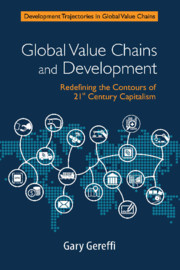Book contents
- Frontmatter
- Dedication
- Contents
- List of Tables
- List of Figures and Boxes
- Foreword
- Acknowledgments
- Sources
- 1 The Emergence of Global Value Chains: Ideas, Institutions, and Research Communities
- Part I Foundations of the Global Value Chain Framework
- Part II Expanding the Governance and Upgrading Dimensions in Global Value Chains
- Part III Policy Issues and Challenges
- 11 Global Value Chain Analysis: A Primer (Second Edition)
- 12 Global Value Chains, Development, and Emerging Economies
- 13 Risks and Opportunities of Participation in Global Value Chains
- 14 Global Value Chains in a Post-Washington Consensus World
- 15 Protectionism and Global Value Chains
- Co-authors
- Index
11 - Global Value Chain Analysis: A Primer (Second Edition)
from Part III - Policy Issues and Challenges
Published online by Cambridge University Press: 09 November 2018
- Frontmatter
- Dedication
- Contents
- List of Tables
- List of Figures and Boxes
- Foreword
- Acknowledgments
- Sources
- 1 The Emergence of Global Value Chains: Ideas, Institutions, and Research Communities
- Part I Foundations of the Global Value Chain Framework
- Part II Expanding the Governance and Upgrading Dimensions in Global Value Chains
- Part III Policy Issues and Challenges
- 11 Global Value Chain Analysis: A Primer (Second Edition)
- 12 Global Value Chains, Development, and Emerging Economies
- 13 Risks and Opportunities of Participation in Global Value Chains
- 14 Global Value Chains in a Post-Washington Consensus World
- 15 Protectionism and Global Value Chains
- Co-authors
- Index
Summary
Importance of Global Value Chains
The global economy is increasingly structured around global value chains (GVCs) that account for a rising share of international trade, global gross domestic product, and employment. The evolution of GVCs in diverse sectors, such as commodities, apparel, electronics, tourism, and business service outsourcing, has significant implications in terms of global trade, production and employment, and how developing country firms, producers and workers integrate in the global economy. GVCs link firms, workers, and consumers around the world and often provide a stepping-stone for firms and workers in developing countries to participate in the global economy. For many countries, especially low-income countries, the ability to effectively insert into GVCs is a vital condition for development. This supposes an ability to access GVCs, to compete successfully and to ‘capture the gains’ in terms of national economic development, capability building and generating more and better jobs to reduce unemployment and poverty. Thus, it is not only a matter of whether to participate in the global economy, but how to do so gainfully.
The GVC framework allows one to understand how global industries are organized by examining the structure and dynamics of different actors involved in a given industry. In today's globalized economy with very complex industry interactions, the GVC methodology is a useful tool to trace the shifting patterns of global production, link geographically dispersed activities and actors within a single industry, and determine the roles they play in developed and developing countries alike. The GVC framework focuses on the sequences of value added within an industry, from conception to production and end use. It examines the job descriptions, technologies, standards, regulations, products, processes, and markets in specific industries and places, thus providing a holistic view of global industries both from the top-down and the bottom-up.
The comprehensive nature of the framework allows policy makers to answer questions regarding development issues that have not been addressed by previous paradigms. Additionally, it provides a means to explain the changed global-local dynamics that have emerged within the past 20 years (Gereffi and Korzeniewicz, 1994).
- Type
- Chapter
- Information
- Global Value Chains and DevelopmentRedefining the Contours of 21st Century Capitalism, pp. 305 - 342Publisher: Cambridge University PressPrint publication year: 2018
- 15
- Cited by

